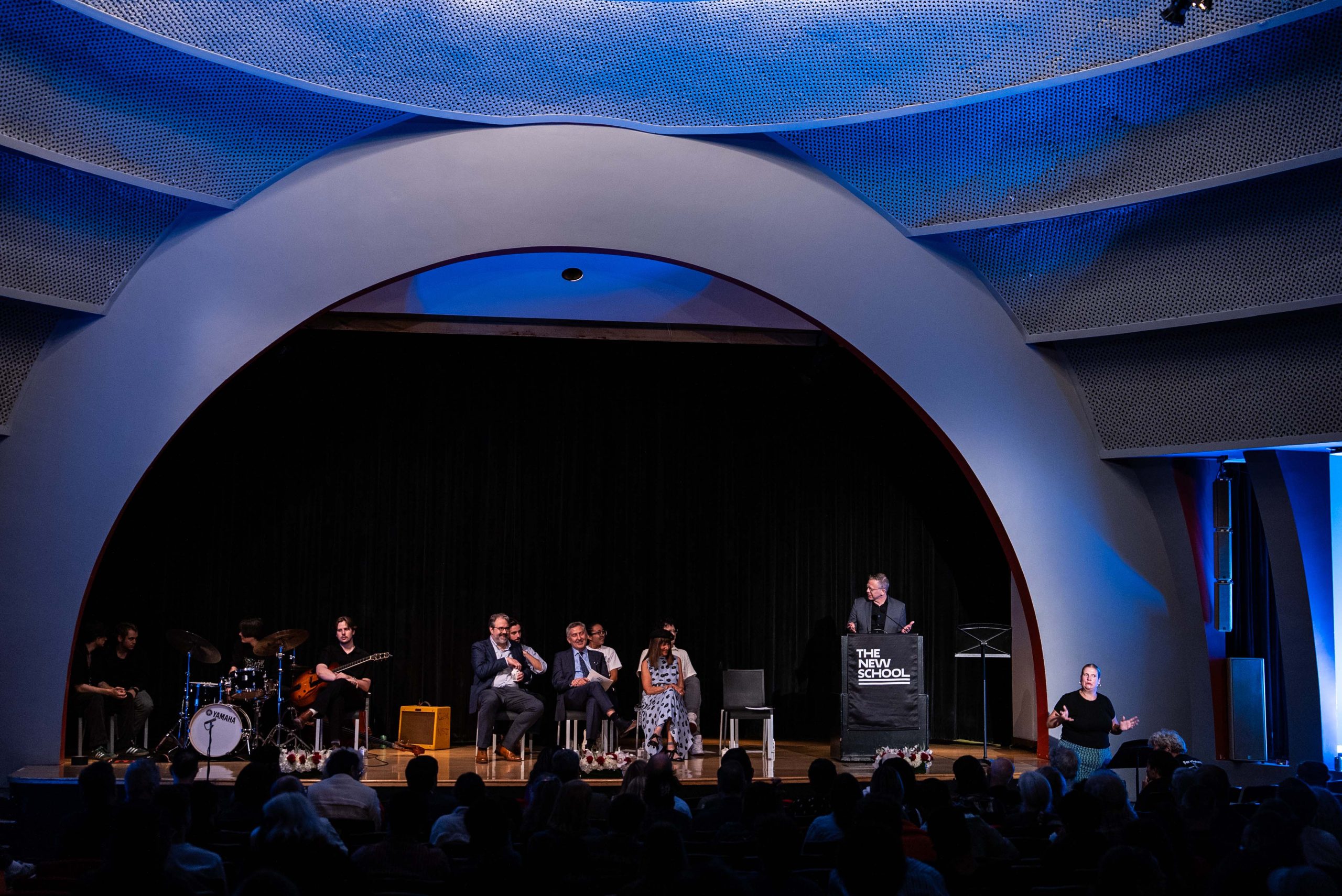
Convocation Welcomes New School Community Back to Campus and Addresses the “Aim of Education”
Colleges and universities have always been in a position to play a powerful role in transforming lives, generating knowledge, shaping culture, and promoting informed critical engagement with important issues and ideas. But they are facing dramatic change and numerous challenges in the 21st century, including technological advances, demographic shifts, and growing doubts about the value of a degree. New School leaders used fall Convocation not only to welcome students, faculty, and staff to campus but to speak about the university’s ability to address those challenges. Held in the university’s historic Auditorium at 66 West 12th Street, a designated New York City landmark, the convocation was the first since 2010.
Joel Towers presided over his first convocation as university president marking a moment of beginning for a new school year. “We are living in a time of deep partisan divide, fueled in part by the fragmenting forces of social media and technology, declining democratic norms and rising nationalisms across the globe, and a rapidly transforming and endangered interlocking web of ecologies and climates driven by human action. Education, research, engagement, experimentation, and innovation in reaction to these transformative forces is at the heart of what we do. We build hope for the future not from naivete but from a determination that things can be different and a belief that education and community are the antidote to ignorance and hate,” said Towers.
Along with Convocation, the event also brought back the “Question of the Aims of Education” keynote address. First framed by John Dewey, one of The New School’s founders, this speech deals with the role of education in its time and the mission that has animated the university since its establishment. Zed Adams, an associate professor of philosophy and the vice president of Technology Initiatives, delivered this year’s address, on the theme “What is the point of a university education in the era of ChatGPT?”
Adams stated that ChatGPT can perform certain tasks—summarizing difficult texts, identifying and critiquing arguments, explaining difficult concepts in an interactive way—very well. But he noted that it lacks what Adams calls the “dialectic of trust and critique.”
“I think that one of the most valuable things you can learn here from us, with us, is how to cope with a world that has become pervasively hyperspecialized. You can learn from us how to navigate the dialectic of trust and critique. This is a hard-earned skill, one that requires practice and judgment. To return to the question I opened with: Why can’t you equally as well learn that from ChatGPT? I think it’s about something about the nature of trust. An education requires trust. Trust requires accepted vulnerability. And accepted vulnerability requires the hope that whoever you’re trusting has your well-being in view. ChatGPT does not have your well-being in view,” said Adams.
“If what I’ve said is correct—that education depends upon trust and trust entails vulnerability—then there’s an important sense in which all of us here are vulnerable to each other. And here’s my attempt at putting this into a slogan: Your success as students depends upon our success as teachers, and vice versa. Our success as teachers depends upon your success at learning how to navigate the dialectic of trust and critique. I think that should be one of our shared goals.”
Richard Kessler, the former executive dean of the College of Performing Arts who now serves as provost and executive vice president for Academic Affairs, presented a performance of one movement from John Cage’s composition 4’33”. Cage studied at The New School in the 1930s and returned in the 1950s as an instructor, remaining for almost a decade. In presenting the work, Kessler said, “Cage taught us the difference between listening and hearing.”
During the event, the New School community was introduced to the faculty members who will be leading four new university-wide interdisciplinary research and scholarship initiatives. Panteá Farvid, an associate professor of applied psychology, will lead the Democracy and Culture initiative; Lara de S. Penin, a professor of transdisciplinary design, will oversee the City initiative; Bhawani Venkataraman, an associate professor of chemistry and associate dean of Faculty Affairs at Eugene Lang College, will direct the Climate and Environmental Justice initiative; and Zed Adams will head the Technology initiative.
The event also featured welcome messages from Kay Unger, Fashion Design ’68, a member of the Board of Trustees; Faculty Senate co-chair Jerzy Gwiazdowski, a faculty member of the School of Drama; Staff Senate co-chair Maria-Elena Grant, senior director of the Democracy and Culture Initiative; and Student Senate co-chairs Emily Li, BA Economics/BFA Communication Design, and Ryder Glickman, BA–MA Economics. The audience also heard performances by students from the School of Jazz and Contemporary Music.